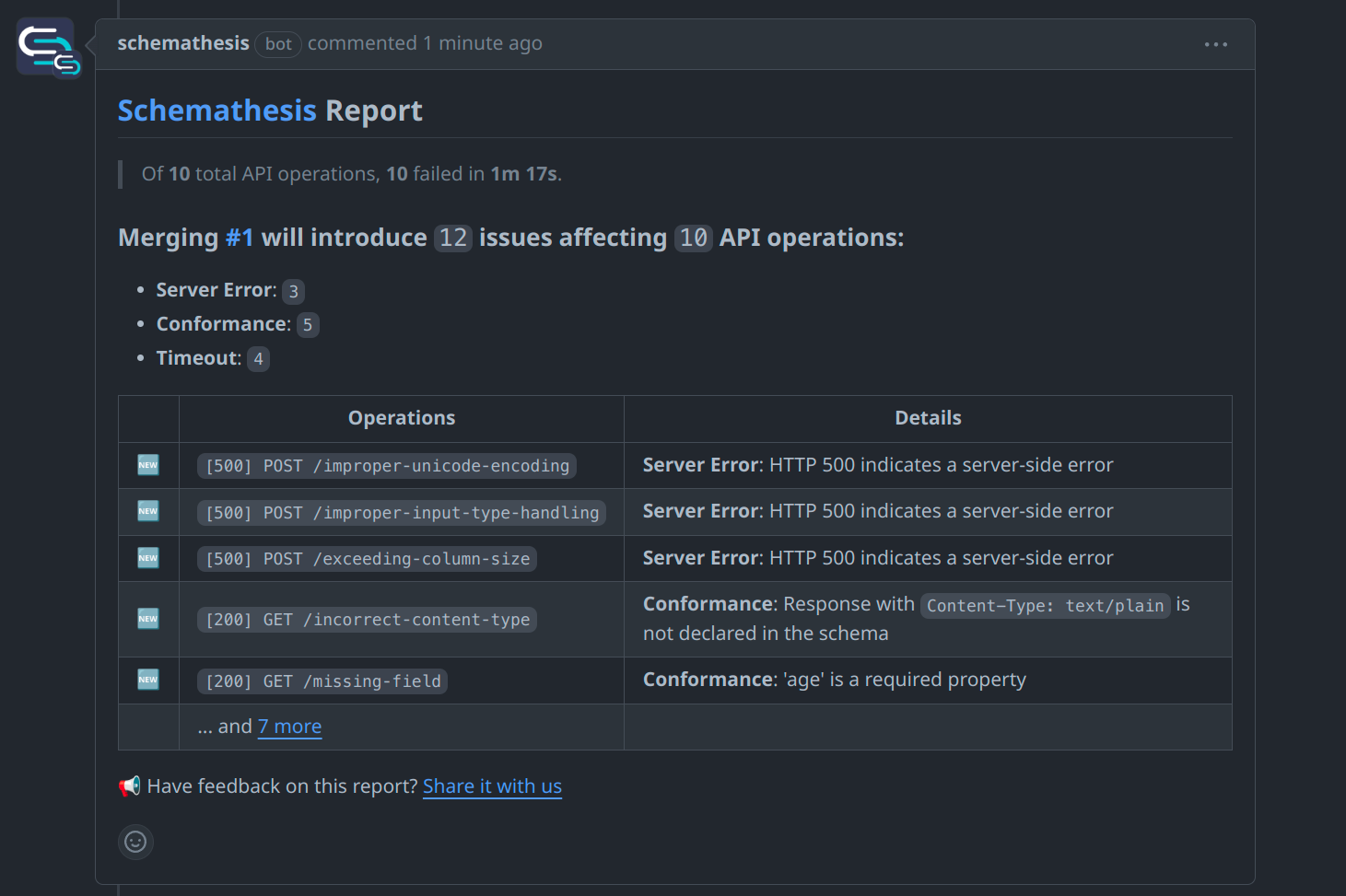Continuous Integration
This guide outlines how to set up Schemathesis for automated API testing in your Continuous Integration workflows.
GitHub Actions
Note
💡 See our GitHub Tutorial for a step-by-step guidance.
For initial setup in a GitHub Actions workflow:
api-tests:
runs-on: ubuntu-latest
steps:
- uses: schemathesis/action@v1
with:
schema: 'http://127.0.0.1:5000/api/openapi.json'
# Optional, for PR comments
token: ${{ secrets.SCHEMATHESIS_TOKEN }}
To get test results as comments in your GitHub pull requests, both the token and the GitHub app are required.
Obtain the token by signing up on Schemathesis.io.

To add headers like Authorization:
# Save access token to $GITHUB_ENV as ACCESS_TOKEN.
- name: Set access token
run: echo "ACCESS_TOKEN=super-secret" >> $GITHUB_ENV
- uses: schemathesis/action@v1
with:
schema: 'http://example.com/api/openapi.json'
args: '-H "Authorization: Bearer ${{ env.ACCESS_TOKEN }}"'
Note
For more details on using Schemathesis with GitHub Actions, refer to the full documentation
GitLab CI
For GitLab users, here’s how to set up Schemathesis in your CI pipeline:
api-tests:
stage: test
image:
name: schemathesis/schemathesis:stable
entrypoint: [""]
script:
- st run http://127.0.0.1:5000/api/openapi.json --checks=all --report
Preparing Your App
In most cases, you’ll want to set up your app in the CI environment. Here’s a GitHub Actions example for a Python app:
api-tests:
runs-on: ubuntu-latest
steps:
- uses: actions/checkout@v3.0.0
- uses: actions/setup-python@v4
with:
python-version: '3.10'
- run: pip install -r requirements.txt
# Start the API in the background
- run: python main.py &
- uses: schemathesis/action@v1
with:
schema: 'http://127.0.0.1:5000/api/openapi.json'
# Optional, for PR comments
token: ${{ secrets.SCHEMATHESIS_TOKEN }}
API Schema in a File
If your API schema is maintained separately from the application, specify its path and set a base URL. This is useful in scenarios where the API schema undergoes independent versioning or resides in a separate repository.
api-tests:
runs-on: ubuntu-latest
steps:
- uses: schemathesis/action@v1
with:
schema: './docs/openapi.json'
base-url: 'http://127.0.0.1:5000/api/v2/'
Environment Variables
You can configure Schemathesis behavior using the following environment variables:
SCHEMATHESIS_HOOKS: Points to a Python module with user-defined Schemathesis extensions. Example:
my_module.my_hooksSCHEMATHESIS_BASE_URL: Set when using a file-based schema to specify the API’s base URL. Example:
http://127.0.0.1:5000/api/v2/SCHEMATHESIS_WAIT_FOR_SCHEMA: Time in seconds to wait for the schema to be accessible. Example:
10SCHEMATHESIS_REPORT_SUGGESTION: Enable or disable report suggestions to upload to SaaS. Valid values:
true,falseSCHEMATHESIS_TOKEN: For SaaS-based pull request comments.
SCHEMATHESIS_TELEMETRY: Toggle sending metadata to SaaS. Valid values:
true,falseSCHEMATHESIS_REPORT: Enable or disable reporting. Valid values:
true,false